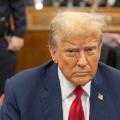Many companies are feeling the financial pain from the coronavirus crisis -- but not Microsoft.
Microsoft's (MSFT) posted earnings per share of $1.40 on $35 billion in revenue for the three months ended in March, which is the company's fiscal third quarter. Both figures beat analysts' expectations. Sales were up 15% compared to last year.
Its shares rose nearly 3% in after-hours trading Wednesday.
In the announcement Microsoft said sales overall didn't take a big hit from coronavirus ripple effects, although some areas such as its advertising business were hurt. Other divisions like the cloud business may have actually received a boost with so many people working and attending school remotely.
We’ve seen two years’ worth of digital transformation in two months. From remote teamwork and learning, to sales and customer service, to critical cloud infrastructure and security – we are working alongside customers every day to help them adapt and stay open for business in a world of remote everything,” CEO Satya Nadella said in a statement.
Revenue from Microsoft’s intelligent cloud segment grew 27% year-over-year to $12.3 billion. That division includes the key Azure cloud business, which competes with Amazon Web Services. Azure revenue grew 59% in the three months, a slight slowdown in growth from the previous quarter.
Microsoft said usage of its cloud services increased as people moved to working remotely, though it acknowledged a slowdown in new deals during the quarter's final weeks. Analysts predicted that companies may cut back on their spending on such enterprise services as they deal with the economic fallout from coronavirus.
The company's gaming and personal computing segments also benefitted from stay-at-home guidelines, Microsoft said.
However, it also acknowledged that its "Search" business was negatively impacted by a drop in advertising spend as a result of coronavirus, something Google (GOOGL) is also grappling with. Microsoft also noted that the effects of coronavirus "may not be fully reflected in the financial results until future periods," as the economic crisis spurred by the virus continues to unfold.


